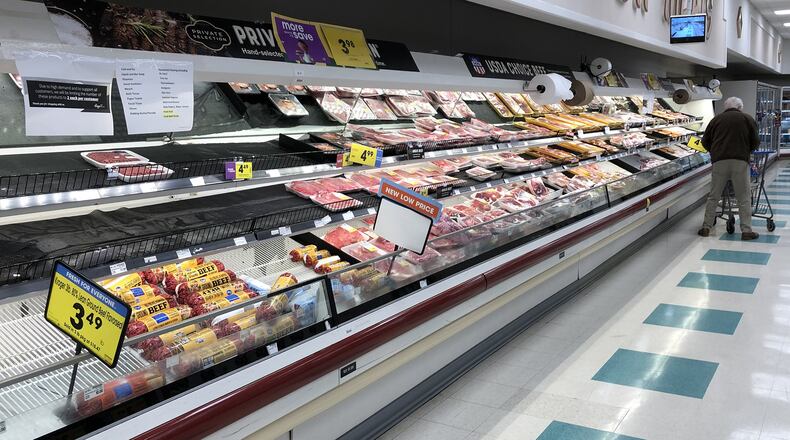“We feel good about our ability to maintain a broad assortment of meat and seafood for our customers because we purchase protein from a diverse network of suppliers,” Rolfes, who handles the Cincinnati/Dayton region, said via email.
RELATED: Complete coronavirus coverage
At Costco, fresh poultry is limited along with beef and pork. According to a post on that company’s website, members may purchase three items from each category.
“Costco has implemented limits on certain items to help ensure more members are able to purchase merchandise they want and need,” according to the company. “Our buyers and suppliers are working hard to provide essential, high demand merchandise as well as everyday favorites.”
Walmart has opted not to place any limits at this time.
“Meat continues to be in high demand as customers stock up on protein,” the company said. “As we would normally do during periods of high demand, we are working through our supply chain to continually replenish items as quickly as possible to help us meet the needs of our customers.”
RELATED: Coronavirus: Will workplaces ever be the same?
The need to do that is another result of the worldwide coronavirus pandemic that has altered many aspects of life in the United States and beyond.
Multiple large meat-packing and processing facilities have closed or had production cutback in recent weeks after outbreaks of the disease hit plants that typically require large numbers of workers to work in close proximity, increasing the chance of the spread of the virus.
The Center for Disease Control and Prevention found cases of COVID-19, the disease caused by the new coronavirus, at 115 meat or poultry processing plants in a total of 19 states – including one facility in Ohio – in a survey of data from April 9-27.
Nearly 5,000 workers were diagnosed with 20 coronavirus-related deaths reported, according to the CDC.
RELATED: What's the biggest thing businesses need right now to survive? Cash
While that organization’s report acknowledged the working environment presents challenges to preventing the spread of coronavirus, it also expressed a belief some measures could be effective.
Those include cleaning and disinfecting work surfaces, increased emphasis on hand hygiene and maintenance of social distancing practices. It also encouraged adjusting medical leave policies to greater dissuade workers from coming to work when potentially ill.
The Associated Press reported a large pork plant in South Dakota owned by Smithfield re-opened Monday with new disease-prevention methods in place, including a tent for screening employees for COVID-19 symptoms.
Tyson also reopened a pork plant in Indiana on Monday with more to follow according to the AP.
READ MORE: Meat workers cautiously return
While large grocery chains such as Kroger, Walmart and Costco rely heavily on large suppliers such as Tyson and Smithfield, there are others across the country they can tap when necessary.
The closure of schools and many restaurants since March also presents opportunities to reroute meat that might otherwise be headed to those places to grocery stores instead.
“While some processors are experiencing challenges,” Rolfes of Kroger said, “there is plenty of protein in the supply chain.”
About the Author

